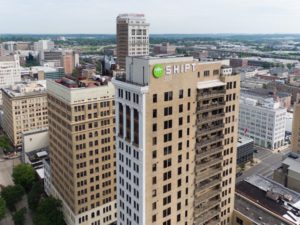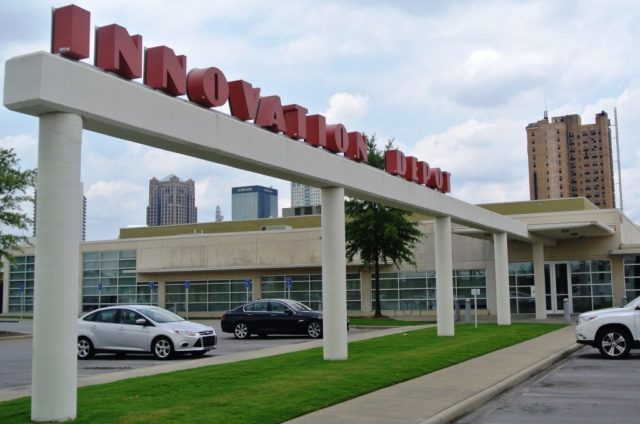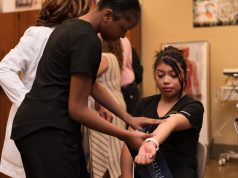By Jon Swartz
Barron’s
There’s an intersection in downtown Birmingham, they call the “heaviest corner on Earth” as a symbol of its status as a steel and iron town nearly a century ago.
Today, one of its pillars – a converted bank in the John A. Hand Building – is home to Shipt, the city’s big tech success story. It employs 400 here, with plans to add another 880 jobs in the next few years.
Such is the economic renaissance of The Magic City.
“It’s been a wild ride,” Bill Smith, founder and Chief Executive of

Shipt, tells Barron’s. “We started [in 2014] as a delivery-platform for other companies, and it was a failure. We pivoted to groceries, and it worked.”
The success of Shipt, which was acquired by Target for $550 million this year, offers a microcosm of what locals are beginning to call the “Southern Silicon Valley.”
Four blocks away, at the Innovation Depot, a shuttered 140,000-square-foot Sears store from the 1980s has been converted into a thriving center for more than 100 tech companies and entrepreneurs in the region.
“The appeal here [Birmingham] is the ability to have a social impact and help build a bigger tech ecosystem,” says Sameer Ather, a cardiologist who is CEO of XpertDox, a 3-year-old company at the depot that has compiled a comprehensive database of the highest-rated doctors specializing in disease treatments.
Another tenant, Helplightning, is the fifth startup of Gary York, a Huntsville, Ala., native who spent time in Silicon Valley. He’s returned home to raise a family and help lead a generation of new companies like his own-which has developed a virtual reality tool for customer-service agents to install or fix equipment. Its customers include Pitney Bowes, Unisys, and Ricoh.
“There’s been a big push the last few years to make this city a favorable spot for tech,” says Kasey Birdsong, co-founder and CEO of Planet Fundraiser, a mobile app for cash-back programs for fundraising located nearby. It has partnered with 500 merchants and 25 major retailers such as Home Depot and Walmart.
“Those who exited to Silicon Valley, Austin, New York, are poring back in as angel investors, mentors, and entrepreneurs,” Honeycutt tells Barron’s.

What is happening in Birmingham reflects a slow but inexorable shift in local economies throughout the U.S. It’s a concept that AOL co-founder Steve Case has famously deemed “The Rise of the Rest.” [In May, Case visited Birmingham as part of what has become an annual tour of cities in America’s heartland.]
Much as Silicon Valley sees itself as the epicenter of high-tech, plenty of technology hubs dot the United States, each with a distinct vertical market that feeds the industry. Charleston, S.C. (aka “Silicon Harbor”), Phoenix (“Silicon Desert”), and a wide swath of the Midwest (“Silicon Prairie”) are testaments to regions that have produced significant companies while largely avoiding the suffocating cost-of-living, traffic snarls, and hyper-competitiveness that dog Silicon Valley, Seattle, New York, and Austin tech workers. [The median cost of a house in Birmingham is $218,577, according to the Alabama Center for Real Estate. That is roughly $1 million less, on average, than San Francisco.]
Birmingham has relied on the banking, insurance, and automotive industries for decades but there are signs of tech’s emergence beyond the depot and Shipt. In June, Amazon announced plans to build an 855,000-square-foot fulfillment center that will employ 1,500.
Like most cities trying to attract tech companies, Birmingham has relied on public-private partnerships-a $15 million effort renovated the old Sears facility that is now home to the Innovation Depot-and the influence of its largest employer (23,000), the University of Alabama at Birmingham. The city is also mulling a direct flight to San Francisco, so as to encourage Silicon Valley companies to establish secondary offices in Alabama. [Shipt has a San Francisco office.]
The sleeping giant in all this is University of Alabama at Birmingham, whose economic impact on the city is about $7 billion annually. It just opened the Bill Harbert Institute for Innovation and Entrepreneurship in hopes of creating a culture that “fosters innovation and entrepreneurship” that works within the framework of the community, says its executive director , Kathy Nugent.
“We want UAB to be a pipeline to the city’s developing tech hub,” she says.
In short, Nugent wants to make UAB a launching pad for the city’s next generation of tech startups.
She points to Ph.D. computer-science candidate Weida Tan, who started Fledging, maker of solid-state storage drives for Apple computers, while in school. “Starting a company is more affordable in Alabama,” he says. “If we try to do the same in California, we would have to raise prices to sell products to meet tax costs.”
Change doesn’t occur overnight, but for downtown Birmingham it is noticeable.
“It was a ghost town” in 2013 when Smith, a Birmingham native, bought the downtown building now housing Shipt, he says. “Now, it is very vibrant, with new hotels, restaurants and thousands of new apartment units built the past five years.”
“Tech is the fastest-growing industry here,” Smith says. “You will soon find names of that industry on the top of buildings downtown besides those of banks and insurance companies.”
Click here to read more about tech; Kids Code; Tech Birmingham.





